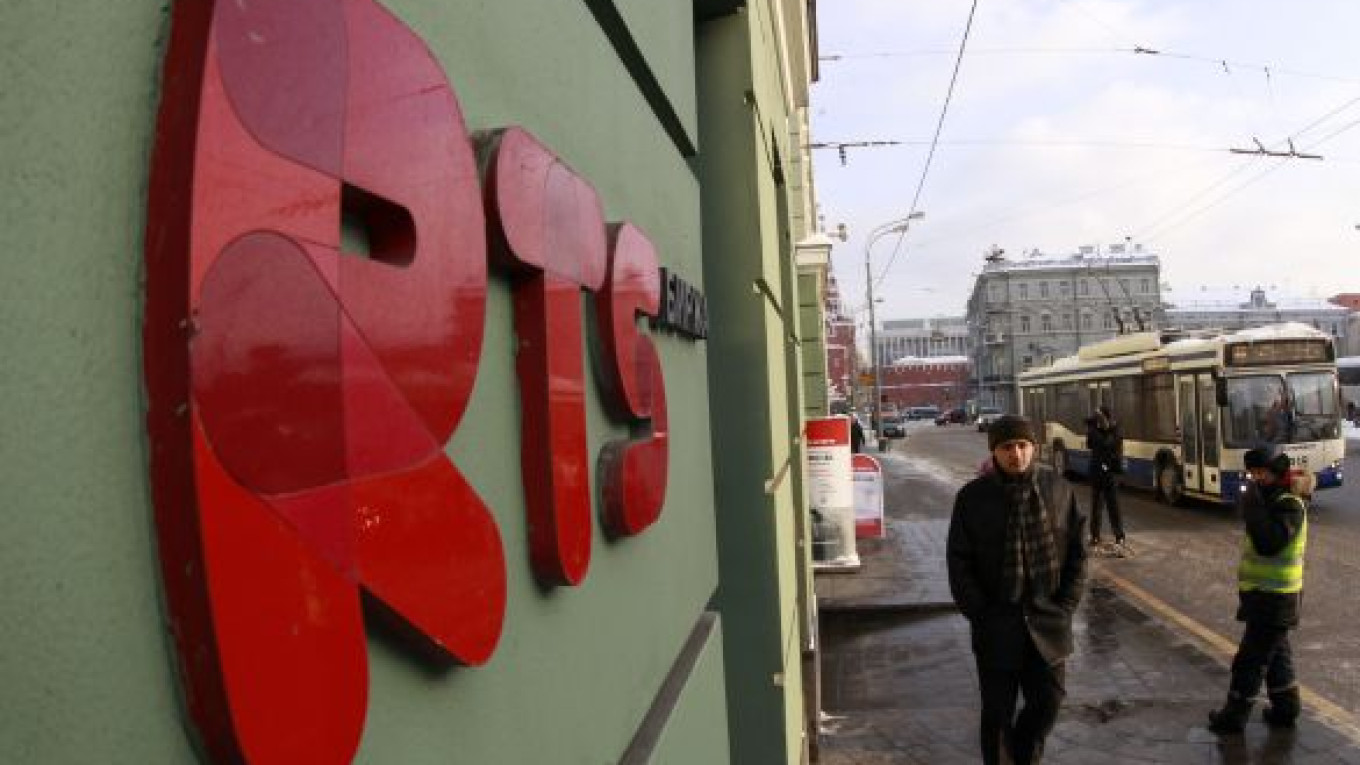The Moscow Exchange announced Monday that it will shun the foreign stock markets traditionally tapped by Russian companies and go ahead with an initial public offering on its own Russian trading platforms.
The size of the stake in the unified exchange being offered to foreign and domestic investors was not disclosed, but the company is looking to raise at least $500 million, said a source familiar the situation.
The Moscow Exchange was formed by the 2012 merger of MICEX and RTS, the country's leading bourses, and was supposed to help the Kremlin transform Moscow into an international financial center. Experts said that the success of the IPO could be a litmus test for how far this aspiration has been realized.
"[The Moscow Exchange's] whole business case is that people should do more business in Moscow," said Bruce Bower, a partner and portfolio manager at Verno Capital.
Media reports had previously suggested that the company would seek a dual flotation in London and Moscow, in a format similar to the biggest listings by Russian companies last year.
Targeting both London and Moscow, state-owned lender Sberbank raised $5.2 billion in September 2012 and telecommunications giant Megafon $1.3 billion two months later.
The Moscow Exchange has "never discussed a float in London," said Nikita Bekasov, a company spokesman.
"The Exchange's own listing is a key element of our strategy to promote the development of local capital markets," said chairman of the Moscow Exchange supervisory board and Central Bank Deputy Chairman Sergei Shvetsov in an emailed statement.
Others were more blunt. "We want to show that Russia is an attractive place for investors," said a source close to the company who requested anonymity to speak freely, adding that this was why Moscow had been picked over London.
Faced with a choice between London and Moscow, however, investors have previously been reluctant to settle on the Russian capital.
Sberbank executives said in advance of their secondary public offering last year that up to 15 percent of the company's placement could be on the Moscow Exchange — but, in the end, 97 percent went to London.
In one of the most recent IPO announcements, private rail freight operator NefteTransService said last week that it is seeking to float only on the London Stock Exchange.
Unlike their more mature compatriots in Europe, the U.S. and Asia, Russian stock exchanges have traditionally been characterized by speculative investors, a dearth of long-term capital and high volatility. And trading volume declines in Moscow have been steeper than other financial centers throughout 2012.
The Moscow Exchange declined to comment on the exact timing of its IPO, but reports suggest that it is planned for mid-February. Nor did it comment on how the IPO funds would be used. ?
The company last week announced earnings of 15.9 billion rubles ($525 million) for 2012 — 36.7 percent higher than the MICEX Index reported for the same period in 2011.
The exchange was valued at $4.5 billion when the merger between MICEX and dollar-denominated RTS was announced, but Central Bank Deputy Chairman Alexei Ulyukayev said early in 2012 that the joint entity was actually worth closer to $6 billion. He has since said that its value is likely to have diminished.
Credit Suisse, J.P. Morgan, Sberbank, CIB and VTB Capital are all global coordinators and bookrunners for the IPO, while Deutsche Bank, Goldman Sachs, Morgan Stanley, Renaissance Capital and UBS are joint bookrunners.
The largest shareholder in the Moscow Exchange is the Central Bank with a 24.3 percent stake. Other shareholders include Sberbank, with 10.3 percent, VTB, Gazprombank, U.S.-based Cartesian Capital and the state owned Russian Direct Investment Fund. ?
Demand for the Moscow Exchange equity is likely to be robust, according to Verno Capital's Bower. "It's a unique asset because it is the dominant exchange in Russia," he said.
But some may be put off by Moscow's apparent lack of progress towards becoming a global financial center — to which the fortunes of the Moscow Exchange are linked, said InvestCafe financial analyst Yekaterina Kondrashova.
While there have been changes to local financial structures, including the creation of a Central Depositary, the city continues to place low in international rankings.
"The Russian government has plans to turn Moscow into an international financial center," said Kondrashova. "But the timeframe keeps being put back."
Related articles:
A Message from The Moscow Times:
Dear readers,
We are facing unprecedented challenges. Russia's Prosecutor General's Office has designated The Moscow Times as an "undesirable" organization, criminalizing our work and putting our staff at risk of prosecution. This follows our earlier unjust labeling as a "foreign agent."
These actions are direct attempts to silence independent journalism in Russia. The authorities claim our work "discredits the decisions of the Russian leadership." We see things differently: we strive to provide accurate, unbiased reporting on Russia.
We, the journalists of The Moscow Times, refuse to be silenced. But to continue our work, we need your help.
Your support, no matter how small, makes a world of difference. If you can, please support us monthly starting from just $2. It's quick to set up, and every contribution makes a significant impact.
By supporting The Moscow Times, you're defending open, independent journalism in the face of repression. Thank you for standing with us.
Remind me later.


